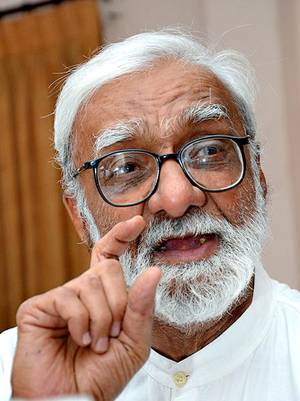An Alternative Lifestyle for Nonviolent World Order :
A Reflection on the Jain and Gandhian Models of Ahimsa
 |
By Mr. H. M. Desarda
The increase in global consumption since 1950 is unprecedented in human history. The six-fold increase, geographically as well as across the income strata, is most skewed. Indeed, there is a new breed of consumerist culture as reflected in automation, gadgetry and all that goes by the name of modernity, progress and development. This led to tremendous throughput of material and energy resources. The pattern of urbanisation and industrialisation pursued in the West and which the ruling elite in the Third World are aping is highly resource-squandering.
North America and Europe have a disproportionately dominant share in global consumption. For example, the US with 5 per cent of the world's population consumes 25 per cent of the world's oil, The top 20 per cent consume 86 per cent of goods and services, whereas the share of bottom 20 percent is only 1.3 per cent. Limits are very clear.
Both in terms of source as well as sink the limits are over-stepped. In view of its adverse impact on and implications for the human health and happiness this trend is not at all desirable. Not only has it alienated human-beings from Nature but it has also led to a deep divide between fellow human beings and to discord between different groups, communities and societies. The process of mass production is such that it has destroyed the sense of creativity and community. All in all, there is excessive overuse of resources and tremendous waste.
The arrogance to control and conquer nature for trivial creature comforts and senseless consumerism has done great harm to the web of life and link between all living creatures. Indisputably, the misapplication and misuse of science and technology is really a serious issue.
The growth-mania" and craze for unbridled consumption has threatened the security of the planet and people. The ecological toll of the undifferentiated and undirected growth has become most burdensome. The rate at which the resources are declining and ecological degradation is taking place is most alarming. Availability not only of the nonrenewable resources-like minerals and fossilfuels-but even the renewable resources are depleting both in quality and quantity. Indeed," the way in which the precious lifesupport system is jeopardised has compelled all thinking people to reflect on the resourcesquandering lifestyles adopted in the 'developed' industrial societies and by the elite in newly industrialising or developing countries. In sum, it is not at all equitable and sustainable.
The root cause of the present ecological threat is the path and pattern of industrialisation and dominant model of development that is pursued as the desirable development ideology the world over. The recent emphasis on globalisation has abated and accentuated this mad race for growth.
The visionaries, philosophers, and saints all over the world have warned us about the dangers of excessive obsession with materialism which harms nature and is antithetical to the welfare of a large majority of human beings. M.K. Gandhi foresaw this crisis and warned the world in his seminal essay 'Hindi Swaraj' (Indian Home Rule) in 1909, when the world was under the euphoria of the technological advent. It was most apt and accurate critique of the Industrial Society, which was on anvil as a dominant development ideology then. In unequivocal terms he called it a Satanic Civilization.
In the past 90 years the world has witnessed the manifestation of the Satan. The creed and greed of consumerism has pushed the world to the brink of disaster. The Limits to Growth' proposition which was debunked as a doomsday forecast is now reluctantly accepted as a reality.
Gandhi was neither a professional economist or ecologist but he had the insight to see the crisis. He pleaded for reducing the wants voluntarily. As we enter the new millennium his proposition. 'The Earth has enough for everyone's needs but not for anybody's greed' should be the guiding motto to usher in a sustainable, humane and enlightened global social order.
The current growth trajectory and the treadmill of production squarely depend on the market, particularly the consumers. So long as there is demand, albeit artificially propelled by all kinds of advertisement, we cannot bring about a decisive change in this. In fact, it is not a case of consumer choice but a choice-paralysis! The cardinal principle of the consumer sovereignty is ruthlessly flouted by the powerful industrial and business lobby. The vicious grip of the greed, and profit motive have trampled basic moral and ethical considerations. Indeed, it has turned society into a monstrous mall, where the scenario of 'shop till you drop' rules the roost. The supra consumer society, propelled by automation, automobile and high-tech. robotics etc. is telling heavily upon human health, happiness and harmony with nature.
It is very gratifying that people in the developed industrial countries are fast realising the cost and consequences of consumerist trap and striving to adopt simple lifestyles. In the transition to sustainable development the place and importance of industrial transformation is most crucial and strategic. The consumers can and should play a pivotal role in this. In fact, it is high time to launch a global consumer movement as a countervailing movement to promote equitable and sustainable development. In this the life and message of Gandhi can show us the pathway both as a practical guide and philosophy of greater common good. The moral is: Let us live simply so that others may simply live.
-----------------------------------------------------
Author : Mr. H. M. Desarda is professor Econimics and former Member, State Planning Board, Maharashtra State Government. He is an exponent of Gandhian thought.
Article Source : Anuvibha Reporter ( Special Issue : Dec. 2000 )
Ahimsa, Peacemaking, Conflict Prevention and Management Proceedings and Presentations
Fourth International Conference on Peace and Nonviolent Action ( IV ICPNA )
New Delhi : Nov. 10-14, 1999
-----------------------------------------------------
Mail to : Ahimsa Foundation
www.jainsamaj.org
R090804